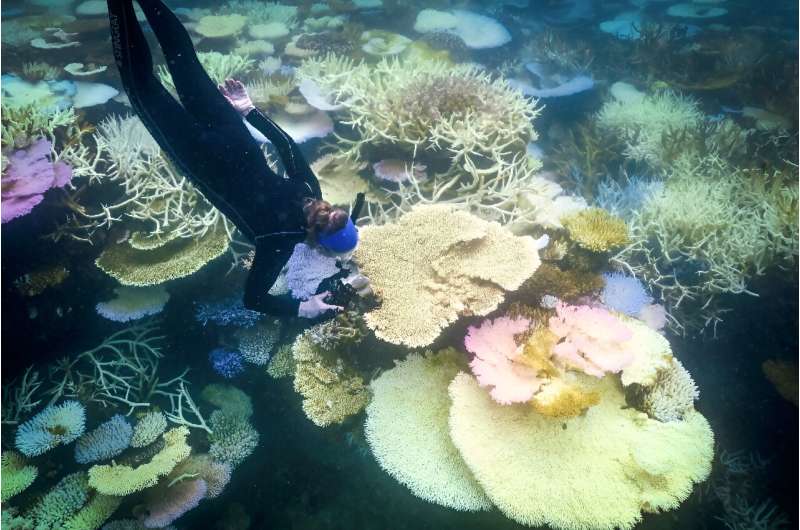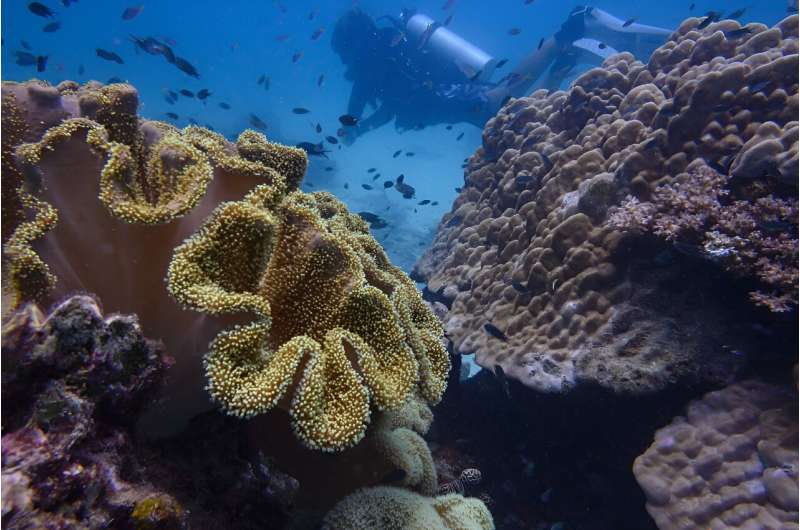
Jakkapat Yodnil calls out to visitors at a diving expo in Bangkok, eager to share details of his shop’s expeditions to the azure waters around the Thai island of Koh Tao.
But behind the friendly sales pitch, the 25-year-old fears that bleaching affecting much of the world’s coral this year threatens his livelihood and the marine world he loves.
It’s a worry that ripples through the Thai Dive Expo, a major annual event for regional dive operators.
Coral around the world is in the grip of a mass bleaching event that scientists warned this week is expanding and deepening.
Record ocean temperatures have caused parts of reefs in 62 countries and territories to turn ghostly white as they expel the algae that live inside them.
Thailand has temporarily closed 12 marine national parks to divers over bleaching.
“In January it wasn’t a big thing that you see, but now, you can see it everywhere, every dive site,” Jakkapat, a dive master and freedive instructor, told AFP.
“Everything is changing very quickly. Normally the seas get cold and in the water I need to wear a wetsuit, but this year, I’ve only been wearing a rashguard.”
It’s the same for Kanako Yukinaga, a Japanese dive shop owner who has lived in Thailand for 24 years.
“This year is the worst year for coral bleaching,” said Yukinaga, who is based in Pattaya on Thailand’s eastern Gulf coast.
“We can see it very often, especially at shore dive sites… I’m so sad.”
‘Pretty dire’
Coral lives in a symbiotic relationship with microscopic algae called zooxanthellae, which produce food and give the reef its color.
Without the algae, the reef turns white, and if temperatures don’t come down, the coral will die.
That poses a potentially existential threat to an industry dependent on a vibrant marine world.
Luke Juthasompakorn has only been working as a dive instructor for three years, but said he worries the industry’s future is “pretty dire.”
“I think it’s something that, to be honest with you, is quite depressing,” the 32-year-old said, standing next to a yellow octopus stuffed toy.

“Dive shops have been growing into this mindset of being more reef friendly, but all around I’m not so optimistic about the future.”
Many of those manning booths at the expo, where divers signed up for expeditions and bought colorful fins, acknowledged the industry has sometimes been part of the problem.
Overtourism, careless divers and reckless operators have all contributed to damage or stress at popular sites around the world.
But Steve Minks, an instructor at Koh Tao’s Black Turtle Dive, believes the sector can play a positive role.
He is a certified conservation dive instructor, and offers courses teaching divers how to monitor reef health, including bleaching.
“I can sit here depressed, but what we try to do as a dive center is educate people,” the 58-year-old said.
“The only way we’re going to make any change is by working with education.”
‘You have to be an optimist’
On recent dives, water temperatures hovered around 33 Celsius (91.4 Fahrenheit), even at depths below 20 meters, he said.
“Corals can’t survive at that temperature… it’s a matter of time. If the temperature doesn’t drop, it’s done.”
For now though, the bleaching around Koh Tao is “not bad, considering.”
“You have to be an optimist… There’s a lot of good work going on.”
Interest in conservation dive courses has ticked up at his shop since the pandemic, which he attributes to growing awareness about the threats to coral.
Others also believe the industry has a key role to play in raising awareness and protecting reef health.
“Underwater photography can only be done by divers and we can tell the truth about the situation,” said Yukinaga.
But she said it is hard not to feel helpless given the pace of climate change.
“If it continues like this, maybe the diving industry can’t survive. If the underwater environment cannot survive, maybe the diving industry cannot survive.”
© 2024 AFP
Citation:
At Thailand dive expo, fears for coral’s future (2024, May 17)
retrieved 17 May 2024
from https://phys.org/news/2024-05-thailand-expo-coral-future.html
This document is subject to copyright. Apart from any fair dealing for the purpose of private study or research, no
part may be reproduced without the written permission. The content is provided for information purposes only.







